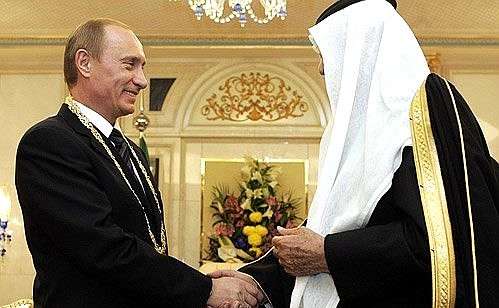The Daily Journalist.

The Russian steal fist has allowed the army of Syrian President Bashar Assad, to make significant progress in its fight against the rebels. Backed by Moscow, the Syrian government forces on Monday fought the fiercest battle since the Russian operation began on 30 September. But these days Moscow also used the velvet glove to try to win Saudi Arabia, a major player in the Syrian conflict but whose approaches are opposed to the Kremlin.
Nearly two weeks after joining the war in Syria, Putin made this weekend to win a the heart of the Saudi defense minister, Mohammed bin Salman gesture, using Formula 1 racing event in Sochi. But the operation has not worked: Riad continue to support opponents of Assad. And require that the Syrian leader leaves power.
But the initiative now is back on the side of Assad, thanks to the Russian air support; backed by 20 Russian bombers, they took the town of Kafr Nabuda in the province of Hama, as part of an offensive to regain territory in the center of the country. Yesterday the struggle for control of the city continued.
Moscow said its aircraft bombed 53 terrorist targets in Syria in 24 hours in the provinces of Homs, Hama, Latakia and Idleb. US, which is now waging a pulse with Russia in Syria, launched last Sunday parachute ammunition in northern Syria to rebels there.
The Russian Foreign Minister Sergei Lavrov said yesterday that the talks had made progress in relations between the two countries, which are economic partners but rivals in the area. Washington and Riyadh disagree “so far” totally, Lavrov said that in diplomatic language means that little progress has been made.
Two weeks later, Russia is still reviewing the damage balance its military incursion into Syria, which has angered governments, each in its own way are supporting the armed opposition in a while. The first red light came on when Gazprom admitted on October 7 that would have delayed the great Turkish Stream gas pipeline project, a key project for the Russians to bring their national treasure -the expenses to European markets.
Ankara is upset by the two Russian fighters raids invading its airspace, but also because the Russian army has attacked moderate forces that have Turkish support. Moscow, which insists that its enemy is the Islamic State has chosen these objectives that posed a serious threat to his protege.
For Saudi Arabia it is essential that Assad falls and it has spent large amounts of money to achieve that cause. A Saudi source sad the Minister of Defense, had told Putin that Russia’s intervention could intensify the war and inspire militants from around the world to fight in Siria.
The Russian government had made significant progress this year to encourage Arab investment in the Russian economy. This collaboration is particularly important now, with Europe and the US encircling the Russian economy with sanctions and restricting their access to credit.
Russian assets are exporting their weapons to Egypt, who have made much progress in their relationship. And offer its technology to build nuclear power plants in countries like Saudi Arabia, Jordan or Turkey. Moscow has failed to make peace with Riyadh.
But maintains a good business climate with the Egyptians, who have not joined the chorus of criticism against the Russian bombings. Relations between Cairo and Moscow have improved in part by cooling between the Egyptian authorities and the White House.
The Kremlin is aware that dialogue between the US and Saudi Arabia not going through its best moment, and in his new role of power in the region directly involved tries to prove luck allying to the Saudis, bitter rivals and energy involved in one of the main weaknesses of Russia: Caucasus jihadist terrorism.
In 2013 talks between the Russian government and the Saudi failed because the latter tried to enforce in negotiations “control” exerted on terrorists in Russian republics such as Chechnya. Blackmail that Vladimir Putin refused to accept. Before Sunday and there were Saudis Russian contacts, but privately.
Senior government officials in Riyadh warned Lavrov in New York that the military escalation in Syria can prolong the conflict. The Saudis and other Sunni powers fear that Russia and its actions in the area are the catalyst for greater Shiite influence in the region.


